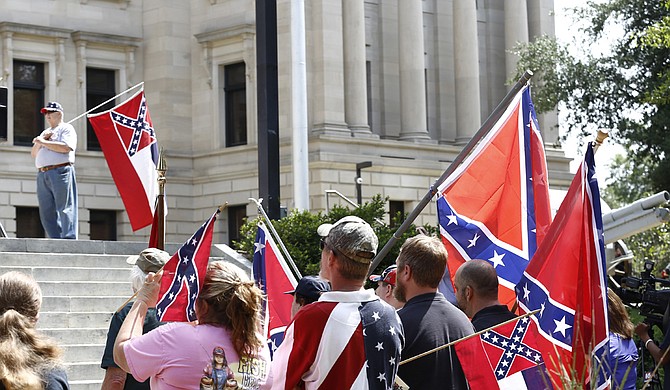The Confederate flag is situated in the top left corner of the Mississippi State flag. It soars above the State Capitol building and thousands of other buildings and homes across Mississippi. Maisie Brown, a 14-year-old Jim Hill student, took her plea to Washington, D.C. asking Mississippians to reevaluate what embracing the symbol means and her own thoughts about how seeing the flag raised above her home state’s capitol makes her feel. Photo Courtesy Imani Khayyam
by Maisie Brown
[gdlr_frame type=”border” align=”left” caption=”Maisie Brown, YMP student from Jackson, Miss., and Carlos Moore, who filed the class action lawsuit against the Mississippi state flag, stand outside the Capitol in Washington D.C. at the “Take Down The Flag” rally.”][gdlr_image_link type=”image” image_url=”https://www.jxnpulse.com/wp-content/uploads/2016/07/VOICES_flag_maisie-300×225.jpg” link_url=”https://www.jxnpulse.com/wp-content/uploads/2016/07/VOICES_flag_maisie.jpg” alt=””][/gdlr_frame]
[gdlr_quote align=”center” ]”I became less timid. I became free. I became me.”[/gdlr_quote]
“Maisie, if I see you take one more picture of yourself, that phone is mine,” my mother said as she wiggled in her seat impatiently, eager for what was about to take place. The night before, she had been on that same bus, riding for almost 18 hours, just to witness me speak on the grounds of the United States Capitol in Washington, D.C.
I shook nervously as I slowly put the phone back in my purse and silently glanced out of the window of a bus as the Pentagon glared back at me. It’s only when we arrived at the Capitol, and I slowly walked down the steps of the bus and my foot hit the ground that the realization kicked in: I was on the grounds of the U.S. Capitol. The scene, though not new to me, caught me by surprise. The place I’d always dreamed of speaking at was now in reach, and my goal was being accomplished. I carefully walked up the steps leading to the capitol, heart pounding faster and faster as I neared its front. When I made it to the top, I closed my eyes and thought silently, this is where I was meant to be. Suddenly, that silence was broken by my mom once again saying, “Maisie, come on! These people want to talk to you!”
Aunjanue Ellis, the actress, had invited me on the trip because of the column I had written for the Jackson Free Press against the Mississippi state flag. She motioned me over, saying said she had someone special to introduce me to. It was Congressman Jared Huffman from California, who had done previous legislative work in Mississippi. He extended his hand. “Hey Maisie, it’s really an honor to meet you.”
It was 11 a.m., and the rally was about to begin. I was about to read the Jackson Free Press column about our Mississippi state flag that had caught the attention of the many who had read it since I wrote it last March.
The Confederate flag that we call our state flag was and is disrespectful. During the Civil War, the most violent war in modern history, the country had been split into sides, the Union and the Confederacy. The Confederacy, which Mississippi was a part of, fought to maintain the industry of slavery, which was the reason the southern states had become so economically powerful. To keep that way of life alive and well, they fought until the bloodshed finally ended with their loss. While the Confederacy fought for the strenuous war, they did so under a battle flag. This flag represented white supremacy. This Confederate flag is still part of the Mississippi state flag that we use to represent us as a whole to everyone else.
I was about to read my own words in the nation’s capital: “I simply ask Mississippians to just consider what it represents and what it truly means to my people. Many claim it’s ‘just a cloth on a stick’ or their own ancestors’ ‘heritage,’ but to me, as a young African American woman, it simply represents nothing but hatred toward me. I am offended when I hear racial slurs or see things that are meant to disrespect my people, but I can get over it because everyone is entitled to their opinions, and some things I have no control over.”
Huge groups of tourists were getting off tour buses left and right, and they all seemed to stop and listen, to spectate. They were intrigued by the large crowd and chants of frustration. Many asked why I was out there and were astounded when they found out. To my surprise, many people around the country had no idea of the flag’s true meaning and why it had recently become such a controversial topic around the country. When they learned of its meaning, they were astonished that we were still having this fight.
My palms sweated. My stomach started to turn. It was that time. I carefully took the speech out of my purse and unfolded it on the podium and spread it out. I had to let them know how I felt. As I spoke, I started to loosen up. I became less timid. I became free. I became me.
“I have witnessed the change in my fellow Mississippians and believe we are on a much better road. We even had an African American Miss Mississippi in 2014,” I read. “But when we mention and try to exhibit the progress we’ve made over the decades, outsiders look at our flag and do not hear anything we’ve said. The flag does nothing bus keep us from progressing as far as we can.”
The crowd hooped and hollered throughout at certain points, especially when I made the statement, “Why was it so simple for Germany to ban the flying of the swastika and signs saying ‘Heil Hitler,’ which depicts a dark and haunting six-year time period in their history, but we can’t simply change a flag of a four-year war that honors 400 years of oppression that still affects us today?”
Once I finished, I settled back behind the podium standing beside the honorable Chokwe Lumumba, Congressman Bennie Thompson, Dr. Michael Eric Dyson and many more distinguished guests. It gave me a warm sense of pride when they stood in awe of me as I stood in awe of them.
My entire trip to Washington, D.C., is an experience I will always remember and appreciate. The people I met, the connections I made and the lives I hope I helped change made that 18-hour trip worth every second.

